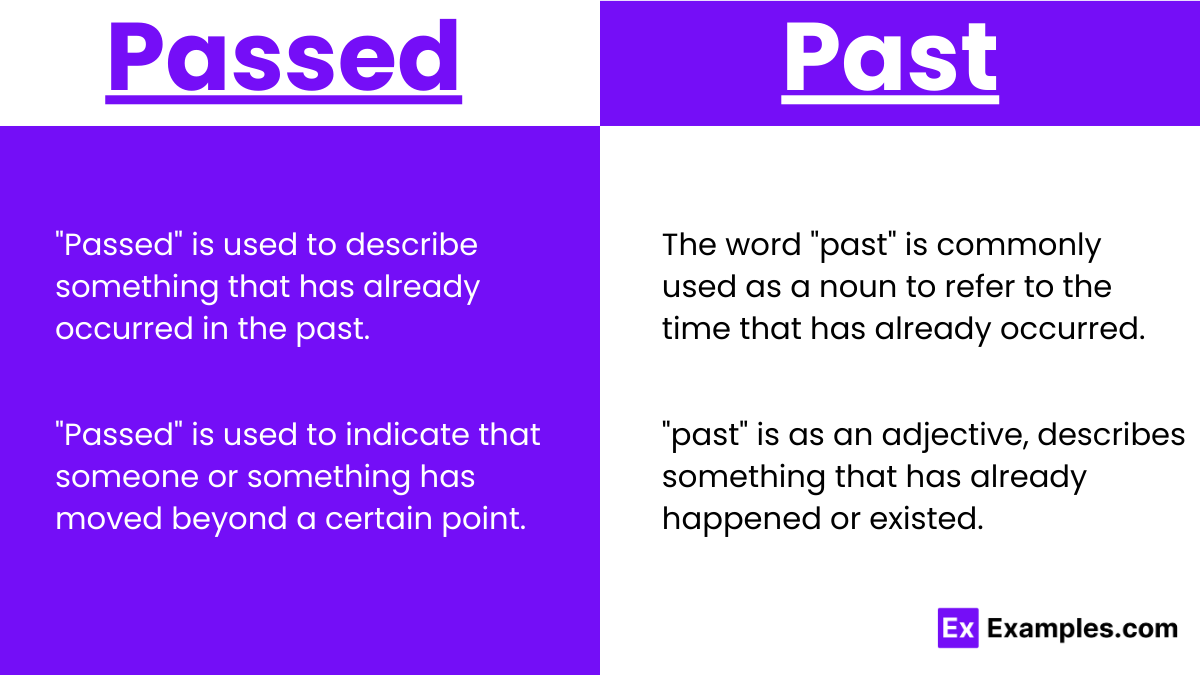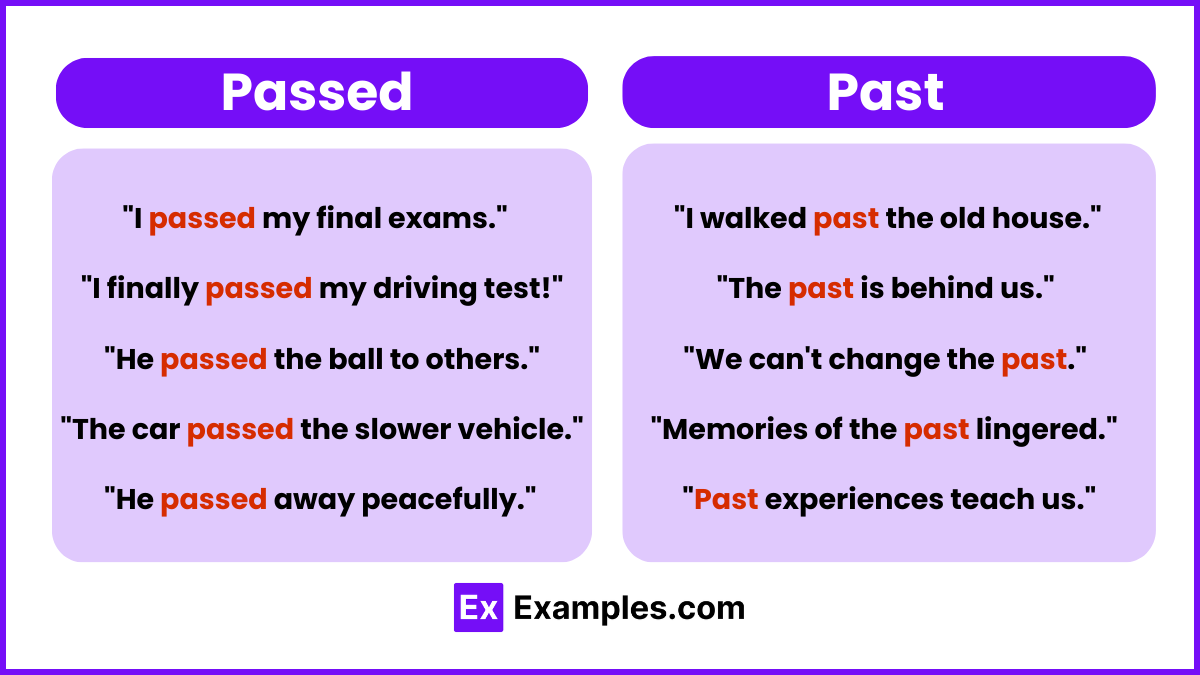Passed vs Past – Meanings, Examples, Difference, Usage
This is a common challenge in English, especially with pairs like “passed” and “past.” These words are homophones, meaning they sound the same but are spelled differently and have distinct meanings. “Passed” refers to completing something successfully, like a test, while “past” relates to time that has already occurred. Let’s get into the differences between these tricky words to help you navigate the English language more easily.
Passed and Past – Meanings
- Passed refers to the past tense form of the verb “to pass,” denoting the action of moving beyond something or someone, or completing a process or duration of time. It functions as a verb and is used to describe actions that have already occurred.
- The word “past” can function as both a noun and an adjective. As a noun, “past” refers to the time before the present moment or to events that have already occurred. As an adjective, “past” describes something that has already happened or existed, or it can refer to something that is beyond a particular point in time.
Summary
In English, “past” and “passed” often cause confusion. “Past” serves as an adjective, adverb, noun, or preposition, indicating time or position. However, “passed” functions solely as the past tense of the verb “pass.” To differentiate, remember: if it involves an action (a verb), it’s “passed”; if it relates to time or position, it’s “past.”
How to Pronounce Passed and Past
- “Passed” is pronounced as /pæst/ (past).
- “Past” is pronounced as /pæst/ in English. It rhymes with “last” and “fast.”
Differences between Passed and Past
| Aspect | Passed | Past |
|---|---|---|
| Part of Speech | Verb | Adjective or Preposition |
| Direction | Often implies movement or progression from one point to another | Indicates a time frame extending backward from the present |
| Grammatical Role | Functions as the past tense of the verb “to pass” | Serves as an adjective or preposition in sentences |
| Context | Commonly used in contexts related to actions, events, or processes | Frequently employed in discussing history, memories, or prior experiences |
| Usage in Language | A dynamic verb often conjugated to match the subject and tense | A static descriptor used to qualify nouns or denote a specific time period |
| Linguistic Usage | Integral to constructing narratives and recounting past events | Used for framing discussions about historical events or personal histories |
How to use Passed and Pass

Passed Usage:
- “Passed” is the past tense form of the verb “to pass.”
- It indicates that someone or something has successfully moved beyond a certain point, obstacle, or situation in the past.
- It can be used in various contexts, such as passing an exam, passing a milestone, or passing away.
Pass Usage:
- As a noun: “Past” refers to a period of time that has already occurred before the present moment. It signifies events, experiences, or actions that happened in earlier periods.
- As an adjective: When used as an adjective, “past” describes something that has already taken place or existed. It can denote historical occurrences, experiences, or situations.
- As an adverb: In its adverbial form, “past” indicates movement or action beyond a specific point in space or time. It often describes an action that occurred in a previous position or location.
- As a preposition: When functioning as a preposition, “past” denotes movement, position, or time extending beyond a particular point or location. It indicates going beyond, or being further along in time or space than something else.
When to use Passed and Past
Passed
- Academic Achievements: Successfully completing an exam or course.
- Driving Tests: Meeting requirements to operate a vehicle safely.
- Time: Reflecting on the movement from one moment to another.
- Traffic: Overtaking a slower vehicle on the road.
- Legislation: Approval of a bill, making it law.
Past
- Time: It denotes a period that has already occurred before the present moment.
- Events: Describing actions or situations that have already happened.
- Direction: Indicates movement beyond a certain point.
- Comparison: Comparing previous states or conditions to current ones.
- Preposition: Showing a point in time or a location that is beyond something.
Passed and Past – Examples

Passed Examples
- She passed her driving test on her first attempt.
- The train passed through the tunnel without any delays.
- The bill has finally passed through Congress after months of debate.
- They quietly watched as the procession passed by the window.
- Time has passed so quickly; it’s hard to believe it’s already March.
Pass Examples
- She glanced wistfully at the old photograph, reminiscing about the past.
- Driving through the countryside, he noticed the remnants of a once-bustling town, now a relic of the past.
- Despite his failures in the past, he remained determined to succeed in the future.
- The historian delved deep into the past to uncover the secrets of ancient civilizations.
- As the sun set, casting a golden hue over the horizon, he reflected on the events of the past day with contentment.
Synonyms
| Passed | Past |
|---|---|
| Gone | Previous |
| Finished | Former |
| Completed | Prior |
| Ended | Earlier |
| Over | Bygone |
Exercise
- He __________ the soccer ball to his teammate.
- The children played in the park __________ sunset.
- She __________ her driving test on her first attempt.
- The ruins of the ancient city are a reminder of civilizations that existed in the __________.
- The legislation was __________ by a narrow margin in the parliament.
Answers:
- passed
- past
- passed
- past
- passed
FAQ’S
Which is correct passed or past?
“Passed” is correct for completion or movement. “Past” is correct for time or position.
Is it walked past or passed?
“Walked past” indicates movement by. “Passed” suggests completion of an action.
Is it past my bedtime or passed?
“Past my bedtime” refers to time. “Passed” denotes completion of an action.
Is it flown past or passed?
“Flown past” indicates movement. “Passed” suggests completion or surpassing.
Is it drove past or passed you?
“Drove past” refers to movement. “Passed” suggests surpassing or completion.


